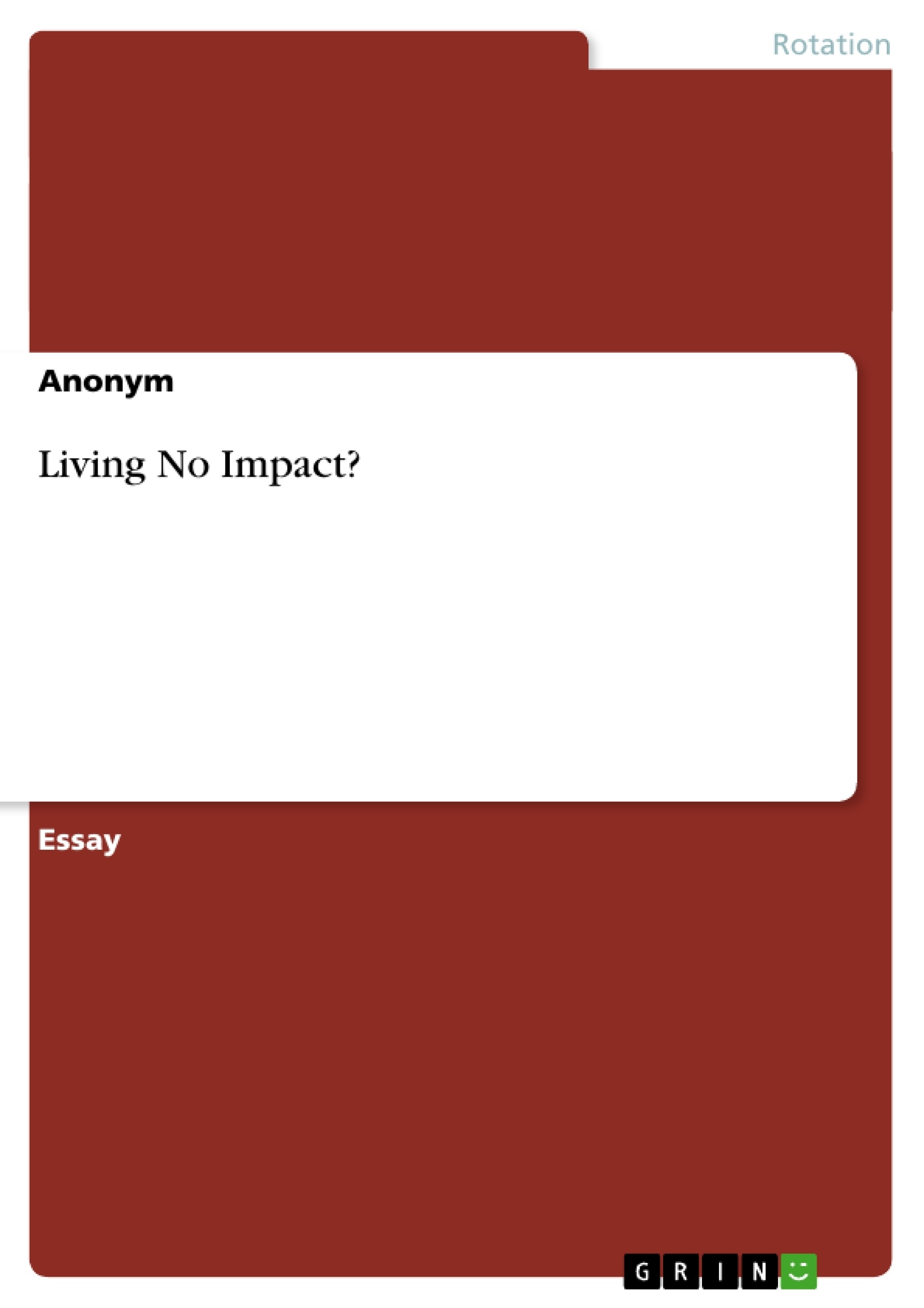Der Essay betrachtet - ausgehend von den Darstellungen in der US-amerikanischen Dokumentation 'No Impact Man' - die Übertragbarkeit radikaler Konzeptionen umweltfreundlicher Lebensweise(n) auf den eigenen Alltag. Es handelt sich hierbei nicht um eine wissenschaftliche Arbeit, sondern eher um eine etwas pointiertere Argumentation. Nichtsdestotrotz greift dies auch auf Quellen zurück.
Inhaltsverzeichnis (Table of Contents)
- Living no Impact?
- The Beavan Family and their Experiment
- Minimizing Human Impact: Autarky and Radical Environmentalism
- Berlin as a City for Implementing "No Impact" Practices
- Challenges of Living "No Impact" in a City: Consumption, Energy, and Waste
- Country Life vs. City Life: Autarky, Cooperation, and Greenhouse Gas Emissions
- The Importance of Individual Action and Social Movements
- Political Institutions and Environmental Policy
- The Role of the State in Sustainable Development
- Integrating Environmental Ideas into Existing Political Parties
- The Effectiveness of Individual Action and the Power of Collective Effort
- The Importance of Local Groups and Civil Society
- The Dilemma of Radical Environmentalism and the Need for Balance
- The Uncomfortability of "No Impact" Living and the Need for Perspective
Zielsetzung und Themenschwerpunkte (Objectives and Key Themes)
This paper explores the feasibility of living "no impact" in a modern industrialized society, using the Beavan family's experiment in the documentary "No Impact Man" as a case study. It analyzes the challenges and opportunities of implementing "no impact" practices in both urban and rural settings, highlighting the limitations of individual action and the importance of collective effort, social movements, and political institutions in achieving sustainable change.- The feasibility of "no impact" living in a modern industrialized society
- The role of individual action in promoting environmental sustainability
- The importance of collective action and social movements in influencing environmental policy
- The interplay between individual action, social movements, and political institutions in achieving sustainable change
- The challenges and opportunities of implementing "no impact" practices in both urban and rural settings
Zusammenfassung der Kapitel (Chapter Summaries)
The paper begins by critically examining the Beavan family's "no impact" experiment, highlighting the inherent contradictions of attempting to live without any impact on the environment within a heavily industrialized society. It argues that even radical environmentalism must strive towards minimizing impact rather than complete elimination. The author then explores the potential for implementing "no impact" practices in a city like Berlin, considering factors such as access to local organic food, opportunities for repair and reuse of goods, and the availability of green energy tariffs. The paper acknowledges the challenges of achieving complete autarky in a city setting while highlighting the potential for collaborative initiatives and community engagement. The author further compares the feasibility of "no impact" living in urban and rural settings, contrasting the advantages of autarky and minimal greenhouse gas emissions in the countryside with the benefits of collaboration and social capital in the city. The paper concludes that a hybrid approach, integrating elements of both urban and rural life, may offer the most promising path toward minimizing environmental impact.Schlüsselwörter (Keywords)
The paper focuses on the key concepts of "no impact" living, radical environmentalism, individual and collective action, social movements, political institutions, sustainable development, urban vs. rural living, and the role of civil society in achieving environmental sustainability. The analysis incorporates real-world examples, including the Beavan family's experiment, the rise of the Green Party in Germany, and the influence of individuals and NGOs on environmental policy.Frequently Asked Questions
What is the "No Impact Man" experiment?
It refers to the Beavan family's attempt to live for one year in New York City with as little environmental impact as possible, avoiding electricity, waste, and motorized transport.
Is it possible to live with zero environmental impact in a modern city?
The essay argues that complete "no impact" is nearly impossible in an industrialized society; the goal should be minimizing impact rather than total elimination.
How does individual action compare to collective effort?
While individual lifestyle changes are important for awareness, the paper emphasizes that large-scale change requires collective action, social movements, and political institutions.
What are the challenges of "no impact" living in Berlin?
Challenges include managing energy consumption, reducing waste in a city infrastructure, and accessing local organic food within a dense urban setting.
What is the difference between urban and rural "no impact" living?
Rural living offers better opportunities for autarky (self-sufficiency), while urban living provides better access to collaborative initiatives and social movements.
What is the role of the state in sustainable development?
The state is responsible for creating the legislative framework and environmental policies that enable and encourage sustainable practices on a national scale.
- Citation du texte
- Anonym (Auteur), 2012, Living No Impact?, Munich, GRIN Verlag, https://www.grin.com/document/214651



